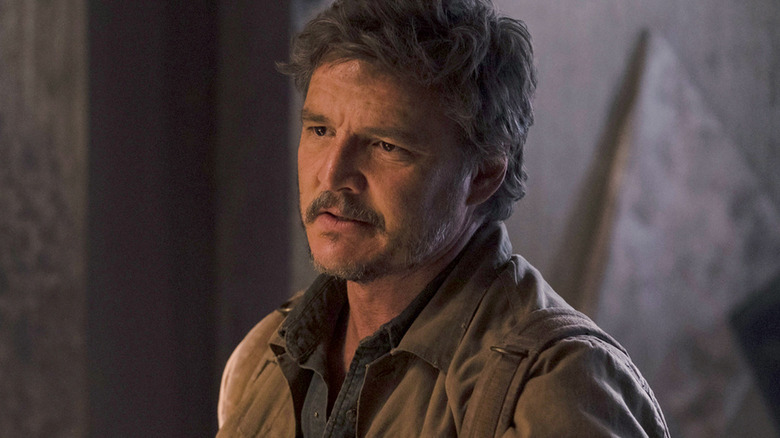HBO's The Last Of Us Has Already Shown Us Exactly Who Joel Is, And Pedro Pascal Is Nailing It
This post contains major spoilers for "The Last of Us" video game (which are also major spoilers for the HBO television adaptation).
With just two episodes down, HBO's "The Last of Us" has already hit on several major moments from the 2013 game that inspired it. While last week introduced traumatized smuggler Joel (Pedro Pascal), his partner Tess (Anna Torv), and teen survivor Ellie (Bella Ramsey), only two of the three made it out of this week's hour alive. In a scene that both drew directly from the original game and reimagined it, Tess met her end before completing her mission to get Ellie to the Fireflies.
It's a scene that's surreal to compare to the Naughty Dog game on which it's based. Some moments, like the one in which Tess pulls back her collar to reveal an infected spot — "Oops, right?" — are identical to the game. Other aspects, like the threat that's knocking at the trio's door while they quickly process the news that Tess was bitten, are totally different. But there's one change from game to screen that's as subtle as it is revealing: this time around, Joel's a bit of a coward.
'We're s***** people'
As a story, "The Last of Us" is as much about what's happening within the two main characters as what's happening around them. We meet Joel when he's a father. He doesn't initially seem like an above-and-beyond dad-of-the-year type, per se, but he's still a good dad who cares deeply about his daughter Sarah. Then she's killed, and in the 20 year interim, Joel becomes closed off. Much of the game is about the emotional barriers Ellie and Joel break down together, and the bond they build despite the fact that they live in world where love and hope aren't meant to thrive.
Joel's not a good guy, though. He may do some heroic things, but he does some terrible ones too. He's a killer, and a criminal, but nothing he does is as questionable as the decision he makes during the shocking climax of the first game. It's a decision he makes out of pure fear and selfishness, and it's one that — if you look closely — you can see echoed and inverted in his scene with Tess this week.
In the video game, in Tess' final scene, she says the quiet part loud: "We're s***** people, Joel. We've been that way for a long time." He isn't ready to accept it, snapping back, "No, we're survivors." When Tess shows him her infection and says she's going to stay behind, Joel seems incredulous and frustrated, but he obviously wants to stay with her. She has to talk him into letting her sacrifice herself, pushing him away when he tries to stay. He pauses for a second, blinks hard, then leaves with Ellie.
Pascal adds subtle layers to this week's death scene
In the adapted version, there's an emotional chilliness to the scene that makes it land in an even more interesting way. "Show me," Joel says when he realizes Tess is infected, and you can already see a sense of distance growing in his eyes. He flinches away from Tess like he's scared of her, and it's a movement that's out of line with all the gruff posturing we've seen from Joel so far. Pascal plays these moments perfectly. When Tess cries, he can't reciprocate. Instead, his face suddenly looks like that of a little boy, stubbornly helpless and uncertain as he shakes his head and furrows his brow. He's in shock, and when he finally does act, it's the wrong move: he shoots a relatively harmless infected that turns out to be tied to a whole horde.
Instead of regaining his sense of authority, Pascal's version of Joel remains muted throughout the scene, his initial surprise melting back into a clenched jaw and a practiced vacant expression. This time around, Tess doesn't have to push him away and beg him to leave her. In fact, she lays her heart briefly bare, saying she never asked him to feel the way she felt, and is met with near-silence in response. We don't see a change in Joel's expression when he decides to go. He just goes, grabbing Ellie by the arm despite her noble, screaming protests. Tess stands alone in the background of a shot in which he pulls Ellie down the hall and doesn't look back.
Joel's reaction is a sign of what's to come
Pascal's impressively layered performance makes this scene so much richer in the TV series than it was in the game, but it also lays Joel's emotional cards on the table much sooner than the source material does. Viewers already know, now, that Joel struggles in the face of potential loss — not just to act and save the day, but to acknowledge the reality of loss and sacrifice altogether. We also know now that he's not just a badass with deeply buried trauma, but an emotional open wound that flares in surprising and sometimes unhelpful ways when pressure is applied. And we know, even though Tess doesn't say it this time, that they may, indeed, be the s***** people after all.
Each beat of the sequence, played with perfectly composed emotional distance by Pascal, ties directly back to the climax of "The Last of Us." The result is that this short, pivotal scene, which is already tragic all on its own, now feels like a painful harbinger of what's to come.



